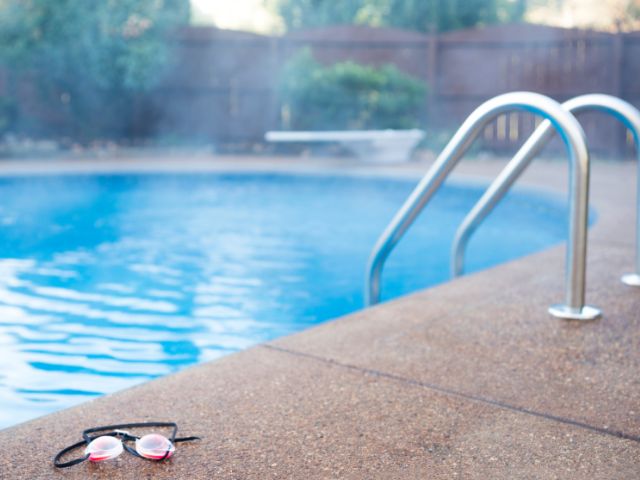
Is It Too Cold to Run My Pool Heat Pump?
Complete Guide for Pool Owners
As the weather cools down, many Florida pool owners wonder if it’s safe to run their pool heat pumps during colder months. While Florida winters are generally mild, there are still a few key considerations to keep in mind when it comes to operating your pool heater in chilly weather.
In this blog post, we’ll explain the effects of cold weather on your pool heat pump, when it’s too cold to run it, and what you can do to protect your system.
How Does Cold Weather Affect Pool Heat Pumps?
Pool heat pumps work by extracting heat from the outside air and transferring it to your pool water. However, as temperatures drop, your heat pump becomes less efficient. The colder the air, the harder your system has to work to extract heat, which can lead to higher energy costs and potential wear and tear.
Most pool heat pumps are designed to operate effectively when the air temperature is between 50°F to 55°F (10°C to 13°C). Below this temperature range, your heat pump may struggle to heat your pool and running it could increase energy consumption without achieving the desired results.
When Is It Too Cold to Run Your Pool Heat Pump?
You might be wondering, “How cold is too cold for my pool heat pump?”
Here’s a breakdown:
- Below 50°F (10°C): Your heat pump will begin to lose efficiency. The colder the air, the longer the unit will have to run to achieve the same results, which could lead to higher electricity bills.
- Below 32°F (0°C): If temperatures drop to freezing or below, running your pool heat pump could damage the system. The water inside the pump and plumbing may freeze, leading to cracked components and costly repairs. Most modern pool heat pumps have freeze protection built in, but it’s still important to take precautions.
What Happens If You Run Your Heat Pump When It’s Too Cold?
Running your heat pump in temperatures below the recommended range can cause several issues:
Decreased Efficiency:
As mentioned, your heat pump won’t be able to extract enough heat from the air, making it run longer and harder to heat your pool.
Higher Energy Bills:
Since the heat pump is working less efficiently, it will consume more electricity to heat your pool, leading to increased energy costs.
Risk of Damage:
Freezing temperatures can damage your heat pump and pool plumbing. If water inside the pump or pipes freezes, it can cause cracks, leaks, and other severe damage.
How Can I Protect My Pool Heat Pump in Cold Weather?
To ensure your pool heat pump lasts through the cooler months, here are a few tips:
1. Monitor the Weather
Keep an eye on the weather forecast, especially if a cold front is moving through. If temperatures are expected to stay below 50°F for extended periods, it may be time to turn off your heat pump to avoid unnecessary strain on the system.
2. Use a Pool Cover
Covering your pool when it’s not in use can help trap heat and reduce the workload on your heat pump. A pool cover also helps minimize heat loss, keeping your water warmer and reducing the need for additional heating.
3. Turn Off the Heat Pump in Freezing Conditions
If temperatures drop to 32°F (0°C) or lower, turn off your heat pump to prevent freezing. Freeze protection features can help, but they are not foolproof, especially if the freeze is prolonged. In freezing weather, you can also consider using a pool freeze protection system, which circulates water through your pump and plumbing to prevent freezing.
4. Adjust Your Heat Pump Settings
Some pool heat pumps are equipped with a “low ambient temperature” setting that helps the system adjust to cooler weather. Check your owner’s manual to see if your unit has this feature, and adjust the settings accordingly to prevent unnecessary wear.
5. Perform Regular Maintenance
Ensure your heat pump is in good working condition by having it regularly serviced. Clean filters and check for any signs of wear and tear to avoid problems when you need the system to run efficiently.
Signs Your Pool Heat Pump Needs Attention
If you notice any of the following signs, it might indicate that your heat pump is struggling in the cold weather and needs attention:
- The pool isn’t reaching the desired temperature despite running the heat pump.
- Unusual sounds or loud noises coming from the heat pump.
- Error codes or warning lights on your heat pump’s display.
- Increased energy consumption or a sudden spike in your utility bills.
Summary for Your Pool Heat Pump Question:
In short, if temperatures drop below 50°F, your heat pump’s performance will decrease, and if it reaches 32°F or lower, there’s a risk of freeze damage. To protect your system, it’s important to monitor weather conditions, use a pool cover, and turn off your heat pump when freezing temperatures are expected. By following these tips, you can help ensure your pool heat pump runs efficiently throughout the cooler months, extending its lifespan and reducing energy costs. Remember, proper maintenance and timely precautions can save you from costly repairs and headaches later.
Want to learn more about maintaining your pool heat pump? Feel free to contact Flow Pool Services for expert advice and service!


